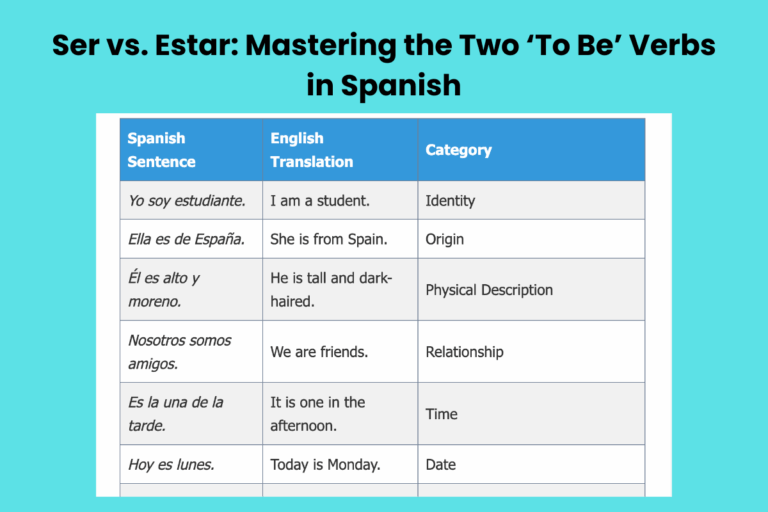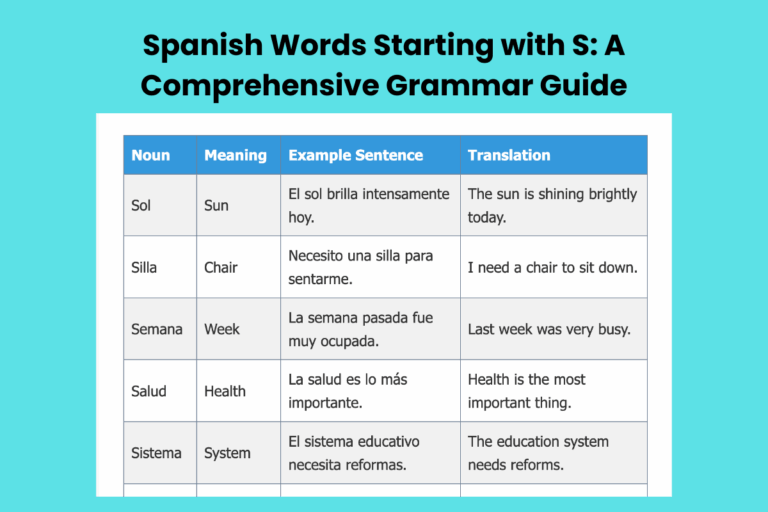Balls in Spanish: A Comprehensive Grammar Guide
Understanding how to say “balls” in Spanish involves more than just direct translation. It requires knowledge of context, regional variations, and potential double meanings.
This article provides a comprehensive guide to navigating the nuances of this topic, covering everything from literal translations to idiomatic expressions and potential pitfalls. Mastering this topic will enhance your understanding of Spanish vocabulary and cultural sensitivity, benefiting language learners of all levels, from beginners to advanced speakers.
This guide is designed for English speakers learning Spanish, Spanish speakers learning English, and anyone interested in the cultural and linguistic aspects of this potentially sensitive topic. By the end of this article, you will have a firm grasp of the different ways to express “balls” in Spanish, understand the contexts in which each term is appropriate, and avoid common mistakes.
Table of Contents
- Introduction
- Definitions and Basic Translations
- Literal Translations
- Figurative Translations
- Structural Breakdown
- Nouns and Gender
- Pluralization Rules
- Types and Categories
- Sports Balls
- Anatomical Terms
- Idiomatic Expressions
- Examples in Context
- Sports Examples
- Anatomical Examples
- Idiomatic Examples
- Usage Rules and Considerations
- Formal vs. Informal
- Regional Variations
- Contextual Appropriateness
- Common Mistakes to Avoid
- Direct Translation Errors
- Contextual Misunderstandings
- Pronunciation Errors
- Practice Exercises
- Translation Exercises
- Fill-in-the-Blank Exercises
- Scenario-Based Exercises
- Advanced Topics
- Slang and Colloquialisms
- Cultural Sensitivity
- Frequently Asked Questions
- Conclusion
Definitions and Basic Translations
The Spanish language offers several ways to translate the English word “balls,” depending on the context. Understanding these nuances is crucial to avoid misunderstandings and ensure accurate communication.
This section will explore the most common translations and their specific uses.
Literal Translations
The most direct translation of “balls” (as in spherical objects) in Spanish is bolas or pelotas. Both terms refer to round objects used in various sports or games. However, their usage can vary slightly depending on the region and the specific type of ball being referred to. Bolas is a more general term, while pelotas often refers to smaller balls or those used in specific sports like tennis or baseball. Consider the context when choosing the appropriate word.
For example, if you are talking about Christmas ornaments, you might use *bolas de Navidad*. If you are discussing tennis balls, *pelotas de tenis* would be more appropriate.
Being specific in your word choice can lead to clearer communication.
Figurative Translations
When referring to “balls” in the anatomical sense, the Spanish language uses different terms, primarily testículos or, more colloquially, huevos. The term testículos is the anatomically correct and formal term. The word huevos, which literally translates to “eggs,” is commonly used in informal contexts. However, it is crucial to be mindful of the audience and situation when using huevos, as it can be considered vulgar in some settings. The level of formality is key.
Furthermore, huevos has various idiomatic uses in Spanish, often conveying courage, audacity, or foolishness. For instance, the expression *tener huevos* means “to have balls” in the sense of being brave or daring. However, using this expression requires careful consideration of the social context and the relationship with the person you are addressing.
Structural Breakdown
Understanding the grammatical structure of Spanish nouns is essential for using the correct terms for “balls” in different contexts. This section will cover the gender and pluralization rules that apply to these words.
Nouns and Gender
In Spanish, nouns have gender, either masculine or feminine. Bolas and pelotas are feminine nouns, so they require feminine articles and adjectives. Testículos and huevos are masculine nouns and require masculine articles and adjectives. Understanding the gender of a noun is crucial for correct grammatical agreement in sentences. For example, you would say *las bolas rojas* (the red balls) because *bolas* is feminine, but *los huevos grandes* (the big balls) because *huevos* is masculine. The gender impacts the adjective and article choices.
Knowing the gender of nouns also impacts the use of pronouns. For example, if you are referring back to *pelotas*, you would use a feminine pronoun such as *ella* (she/it).
Pluralization Rules
The pluralization of nouns in Spanish generally involves adding an “-s” to nouns ending in a vowel and “-es” to nouns ending in a consonant. Bola becomes bolas, and pelota becomes pelotas. However, nouns ending in “-z” change the “z” to a “c” before adding “-es.” The words already discussed are naturally plural, but this rule is crucial for other nouns you’ll encounter. Knowing these basic rules allows for correct sentence construction.
There are some exceptions to these rules, but they are not typically relevant to the words discussed in this article. However, it’s important to be aware that irregularities exist in Spanish pluralization, as in any language.
Types and Categories
The word “balls” can refer to various things, each requiring a specific translation in Spanish. This section will categorize the different types of “balls” and their corresponding Spanish terms.
Sports Balls
When referring to sports balls, the most common translations are pelotas and balones. Pelotas are typically used for smaller balls, such as tennis balls (pelotas de tenis) or baseballs (pelotas de béisbol). Balones are generally used for larger balls, such as soccer balls (balones de fútbol) or basketballs (balones de baloncesto). However, regional variations exist, and the specific term used may depend on the country or region. Therefore, understanding the context is crucial to using the correct term. Note that *balón* is the singular form.
For example, in some Latin American countries, *pelota* might be used for a wider range of sports balls, while in Spain, *balón* might be preferred for larger balls. It’s always a good idea to listen to native speakers and observe their usage to get a better sense of the local preferences.
Anatomical Terms
As mentioned earlier, the primary terms for “balls” in the anatomical sense are testículos and huevos. Testículos is the formal, anatomical term, while huevos is the informal, colloquial term. It is essential to use testículos in medical or formal contexts, while huevos is generally reserved for informal conversations among close friends or family. The formality of the setting dictates the appropriate choice. Using the wrong term could be considered inappropriate or offensive, depending on the situation and the audience.
For example, if you are speaking with a doctor or in a medical setting, it is crucial to use the term testículos. If you are joking with friends, huevos might be acceptable. However, it is always best to err on the side of caution and use the more formal term unless you are certain that the informal term is appropriate.
Idiomatic Expressions
The word “balls” appears in various idiomatic expressions in both English and Spanish. In Spanish, many of these idioms involve the word huevos. As mentioned earlier, *tener huevos* means “to have balls” in the sense of being brave or daring. Other idioms include *estar hasta los huevos*, which means “to be fed up” or “to be up to one’s balls,” and *tocar los huevos*, which means “to bother” or “to annoy.” Understanding these idioms is crucial for comprehending the nuances of the Spanish language and avoiding misinterpretations. These idioms often carry strong connotations and should be used with caution. It’s helpful to familiarize yourself with the cultural context before using them.
For example, if someone says *Estoy hasta los huevos de este trabajo*, they are expressing strong dissatisfaction with their job. It’s important to understand the intensity of the expression to respond appropriately.
Examples in Context
To further illustrate the different uses of “balls” in Spanish, this section provides examples in various contexts. These examples will help you understand how to use the correct terms in different situations.
Sports Examples
The following table provides examples of how to use pelotas and balones in the context of sports:
| English | Spanish |
|---|---|
| The tennis balls are yellow. | Las pelotas de tenis son amarillas. |
| He kicked the soccer ball. | Él pateó el balón de fútbol. |
| The basketball is too big. | El balón de baloncesto es demasiado grande. |
| They are playing with a baseball. | Están jugando con una pelota de béisbol. |
| The golf balls are in the bag. | Las pelotas de golf están en la bolsa. |
| The children are playing with bouncy balls. | Los niños están jugando con pelotas saltarinas. |
| The volleyball game is about to start. | El partido de voleibol está a punto de comenzar. |
| The team needs new soccer balls. | El equipo necesita balones de fútbol nuevos. |
| She bought a new basketball. | Ella compró un nuevo balón de baloncesto. |
| The baseball player hit the ball hard. | El jugador de béisbol golpeó la pelota con fuerza. |
| The tennis player served the ball. | El tenista sacó la pelota. |
| Where are the golf balls? | ¿Dónde están las pelotas de golf? |
| The children love playing with bouncy balls. | A los niños les encanta jugar con pelotas saltarinas. |
| The volleyball net is too high. | La red de voleibol es demasiado alta. |
| The soccer ball is flat. | El balón de fútbol está desinflado. |
| He dribbled the basketball down the court. | Él dribló el balón de baloncesto por la cancha. |
| The baseball landed in the stands. | La pelota de béisbol aterrizó en las gradas. |
| She practiced her serve with the tennis balls. | Ella practicó su saque con las pelotas de tenis. |
| The golf balls are expensive. | Las pelotas de golf son caras. |
| They bounced the bouncy balls off the wall. | Rebotaron las pelotas saltarinas contra la pared. |
| The volleyball players are warming up. | Los jugadores de voleibol están calentando. |
| The soccer team won the championship. | El equipo de fútbol ganó el campeonato. |
| He is a great basketball player. | Él es un gran jugador de baloncesto. |
| The baseball game was canceled due to rain. | El partido de béisbol fue cancelado debido a la lluvia. |
| She enjoys playing tennis. | A ella le gusta jugar al tenis. |
| He lost his golf balls. | Perdió sus pelotas de golf. |
| The bouncy balls are very colorful. | Las pelotas saltarinas son muy coloridas. |
| The volleyball players are very tall. | Los jugadores de voleibol son muy altos. |
This table showcases the correct usage of *pelotas* and *balones* in various sports contexts, helping to clarify their specific applications.
Anatomical Examples
The following table provides examples of how to use testículos and huevos in the anatomical sense:
| English | Spanish |
|---|---|
| The doctor examined his testicles. | El médico examinó sus testículos. |
| He hurt his balls playing soccer. (informal) | Se lastimó los huevos jugando al fútbol. |
| Testicular cancer is a serious disease. | El cáncer testicular es una enfermedad grave. |
| The man had pain in his testicles. | El hombre tenía dolor en sus testículos. |
| (Informal) Don’t be a chicken! (Don’t be without balls!) | ¡No seas gallina! (¡No seas sin huevos!) |
| He underwent a testicle examination. | Se sometió a un examen de testículos. |
| (Informal) He has a lot of courage. (He has a lot of balls) | (Informal) Él tiene mucho valor. (Él tiene muchos huevos) |
| The doctor explained the procedure for the testicle surgery. | El médico explicó el procedimiento para la cirugía de testículos. |
| (Informal) He is very annoying. (He touches the balls a lot.) | (Informal) Él es muy molesto. (Él toca mucho los huevos.) |
| The testicles are located in the scrotum. | Los testículos están ubicados en el escroto. |
| The doctor palpated the patient’s testicles. | El médico palpó los testículos del paciente. |
| (Informal) I am fed up with this situation. (I’m up to my balls with this situation.) | (Informal) Estoy harto de esta situación. (Estoy hasta los huevos de esta situación.) |
| The urologist specializes in testicle health. | El urólogo se especializa en la salud de los testículos. |
| (Informal) He has a lot of nerve. (He has a lot of balls) | (Informal) Él tiene mucho descaro. (Él tiene muchos huevos) |
| The medical report detailed the condition of the testicles. | El informe médico detalló la condición de los testículos. |
| (Informal) I’m so tired of this. (I’m so with the balls of this.) | (Informal) Estoy tan cansado de esto. (Estoy tan con los huevos de esto.) |
| The doctor recommended regular testicle self-exams. | El médico recomendó autoexámenes regulares de testículos. |
| (Informal) He’s got some guts! (He has balls!) | (Informal) ¡Tiene agallas! (¡Tiene huevos!) |
| The surgeon removed the tumor from the testicle. | El cirujano extirpó el tumor del testículo. |
| (Informal) I’m up to here with this! (I’m up to the balls with this!) | (Informal) ¡Estoy hasta aquí con esto! (¡Estoy hasta los huevos con esto!) |
| The biopsy results showed the health of the testicle. | Los resultados de la biopsia mostraron la salud del testículo. |
| (Informal) He really annoys me. (He really touches my balls.) | (Informal) Me molesta mucho. (Me toca mucho los huevos.) |
| The specialist discussed the health of the testicles. | El especialista discutió la salud de los testículos. |
| (Informal) This is driving me crazy. (This is breaking my balls.) | (Informal) Esto me está volviendo loco. (Esto me está rompiendo los huevos.) |
| The doctor explained the symptoms related to the testicles. | El médico explicó los síntomas relacionados con los testículos. |
| (Informal) I am completely fed up. (I am completely up to the balls.) | (Informal) Estoy completamente harto. (Estoy completamente hasta los huevos.) |
This table illustrates the appropriate use of *testículos* in formal medical contexts and *huevos* in informal situations, with a focus on being mindful of the context and audience.
Idiomatic Examples
The following table provides examples of idiomatic expressions using huevos:
| English | Spanish |
|---|---|
| He has a lot of courage. (He has balls.) | Tiene muchos huevos. |
| I’m fed up with this job. (I’m up to my balls with this job.) | Estoy hasta los huevos de este trabajo. |
| Don’t bother me! (Don’t touch my balls!) | ¡No me toques los huevos! |
| He’s got some guts! (He has balls!) | ¡Tiene huevos! |
| This is driving me crazy! (This is breaking my balls!) | ¡Esto me está rompiendo los huevos! |
| He is very annoying. (He touches the balls a lot.) | Él toca mucho los huevos. |
| I’m up to here with this! (I’m up to the balls with this!) | ¡Estoy hasta los huevos con esto! |
| He really annoys me. (He really touches my balls.) | Me toca mucho los huevos. |
| I am completely fed up. (I am completely up to the balls.) | Estoy completamente hasta los huevos. |
| (He is very brave.) He has a lot of balls. | (Él es muy valiente.) Tiene muchos huevos. |
| I’m so tired of this. (I’m so with the balls of this.) | Estoy tan cansado de esto. (Estoy tan con los huevos de esto.) |
| Don’t be a chicken! (Don’t be without balls!) | ¡No seas gallina! (¡No seas sin huevos!) |
| He has a lot of nerve. (He has a lot of balls) | Él tiene mucho descaro. (Él tiene muchos huevos) |
| I am completely fed up with this situation. (I am completely up to the balls with this situation.) | Estoy completamente harto de esta situación. (Estoy completamente hasta los huevos de esta situación.) |
| He’s making things difficult. (He is breaking the eggs.) | Él está complicando las cosas. (Él está rompiendo los huevos.) |
| I’m fed up to the teeth with this. (I’m up to the balls with this.) | Estoy hasta las narices con esto. (Estoy hasta los huevos con esto.) |
| He’s always bothering me. (He’s always touching my eggs.) | Siempre me está molestando. (Siempre me está tocando los huevos.) |
| I’ve had enough! (I’m up to the balls!) | ¡Ya he tenido suficiente! (¡Estoy hasta los huevos!) |
| He’s got a lot of courage. (He has a lot of eggs.) | Tiene mucho valor. (Tiene muchos huevos.) |
| I’m sick and tired of this. (I’m sick and tired up to the balls of this.) | Estoy harto y cansado de esto. (Estoy harto y cansado hasta los huevos de esto.) |
| He’s stirring up trouble. (He’s breaking the eggs.) | Está causando problemas. (Está rompiendo los huevos.) |
| I’m fed up with his excuses. (I’m up to the balls with his excuses.) | Estoy harto de sus excusas. (Estoy hasta los huevos de sus excusas.) |
| He’s getting on my nerves. (He’s touching my eggs.) | Me está sacando de quicio. (Me está tocando los huevos.) |
| I’m fed up with the traffic. (I’m up to the balls with the traffic.) | Estoy harto del tráfico. (Estoy hasta los huevos del tráfico.) |
| He’s always making a mess. (He’s always breaking the eggs.) | Siempre está haciendo un desastre. (Siempre está rompiendo los huevos.) |
| I’m fed up with his complaining. (I’m up to the balls with his complaining.) | Estoy harto de sus quejas. (Estoy hasta los huevos de sus quejas.) |
| He’s really getting on my nerves. (He’s really touching my eggs.) | Realmente me está sacando de quicio. (Realmente me está tocando los huevos.) |
This table highlights the importance of understanding idiomatic expressions to grasp the full meaning of conversations and avoid misinterpretations. Remember that idiomatic expressions can vary by region and context.
Usage Rules and Considerations
Using the correct term for “balls” in Spanish requires careful consideration of several factors, including the level of formality, regional variations, and the specific context of the conversation.
Formal vs. Informal
As previously mentioned, the distinction between formal and informal language is crucial. In formal settings, such as medical consultations or professional discussions, it is essential to use the term testículos when referring to the anatomical sense of “balls.” Using huevos in these contexts would be considered inappropriate and unprofessional. In informal settings, such as conversations with close friends or family, huevos may be acceptable, but it is always best to err on the side of caution if you are unsure of the audience’s comfort level. The key is to be mindful of your audience and the setting.
For example, if you are speaking with a doctor about a medical condition, you should always use the term testículos. However, if you are joking with friends about a sports injury, huevos might be acceptable. However, if you are unsure, it is always best to use the more formal term.
Regional Variations
The Spanish language has many regional variations, and the specific terms used for “balls” can vary depending on the country or region. While bolas and pelotas are generally understood throughout the Spanish-speaking world, their specific usage may differ. For example, in some Latin American countries, pelota might be used for a wider range of sports balls than in Spain. Similarly, the acceptability of using huevos in informal contexts may vary depending on the region. Some regions may be more conservative and consider it vulgar, while others may be more relaxed. Therefore, it is essential to be aware of the regional variations and adapt your language accordingly. Listening to native speakers is always beneficial.
For example, if you are traveling to Spain, you might notice that the term balón is more commonly used for larger sports balls than in some Latin American countries. Similarly, if you are speaking with someone from a more conservative region, it might be best to avoid using huevos altogether.
Contextual Appropriateness
The context of the conversation is crucial in determining the appropriate term for “balls.” When referring to sports balls, you should use pelotas or balones, depending on the size and type of ball. When referring to the anatomical sense of “balls,” you should use testículos in formal settings and huevos in informal settings, if appropriate. When using idiomatic expressions, you should be aware of the connotations and potential offensiveness of the expression and use it only in appropriate contexts. Understanding the nuances of the language is key to effective communication.
For example, if you are discussing a medical condition, you should always use the term testículos. If you are joking with friends about a sports injury, huevos might be acceptable. However, if you are unsure, it is always best to use the more formal term. Similarly, if you are using an idiomatic expression, you should be aware of the potential offensiveness of the expression and use it only in appropriate contexts.
Common Mistakes to Avoid
Several common mistakes can occur when translating “balls” into Spanish. This section will address these errors and provide guidance on how to avoid them.
Direct Translation Errors
One common mistake is to directly translate “balls” as bolas in all contexts. While bolas is a valid translation for spherical objects, it is not appropriate in the anatomical sense. Using bolas in this context would be considered incorrect and potentially confusing. Similarly, using pelotas for larger sports balls, such as soccer balls, would also be a mistake. Understanding the specific meaning of each term is key to avoiding these errors. Always consider the context and the intended meaning when choosing the appropriate translation.
For example, saying *Me duelen las bolas* when referring to testicular pain would be incorrect. The correct term would be *Me duelen los testículos* or, informally, *Me duelen los huevos*.
Contextual Misunderstandings
Another common mistake is to misunderstand the context of the conversation and use the wrong term. For example, using huevos in a formal setting would be inappropriate. Similarly, using an idiomatic expression without understanding its connotations could lead to misunderstandings or offense. It is essential to pay attention to the context of the conversation and choose the appropriate term accordingly. If in doubt, err on the side of caution and use the more formal term.
For example, using the expression *Estoy hasta los huevos* in a professional setting would be highly inappropriate. The expression is considered vulgar and should only be used in informal conversations with close friends or family.
Pronunciation Errors
While not directly related to grammar, pronunciation errors can also lead to misunderstandings. For example, mispronouncing testículos could make it difficult for the listener to understand what you are saying. Similarly, mispronouncing idiomatic expressions could change their meaning or make them nonsensical. It is essential to practice the pronunciation of these words and expressions to ensure clear communication. Using online resources or language learning apps can be helpful in improving pronunciation.
For example, the word *testículos* has a stress on the second syllable (*tés-ti-cu-los*). Misplacing the stress could make the word sound strange or unfamiliar to native speakers.
Practice Exercises
To reinforce your understanding of the different ways to say “balls” in Spanish, this section provides practice exercises with varying levels of difficulty.
Translation Exercises
Translate the following sentences into Spanish, paying attention to the context and choosing the appropriate term:
| Question | Answer |
|---|---|
| 1. The soccer ball is deflated. | El balón de fútbol está desinflado. |
| 2. The doctor examined his testicles. | El médico examinó sus testículos. |
| 3. I’m fed up with this situation! (informal) | ¡Estoy hasta los huevos de esta situación! |
| 4. The tennis balls are new. | Las pelotas de tenis son nuevas. |
| 5. He has a lot of courage. (informal) | Tiene muchos huevos. |
| 6. The basketball game is tonight. | El partido de baloncesto es esta noche. |
| 7. He hurt his balls playing sports. (informal) | Se lastimó los huevos jugando deportes. |
| 8. The baseball player hit the ball. | El jugador de béisbol golpeó la pelota. |
| 9. I’m tired of hearing excuses. (informal) | Estoy hasta los huevos de escuchar excusas. |
| 10. The doctor specialized in testicle health. | El médico se especializó en la salud de los testículos. |
These translation exercises help solidify the understanding of the various contexts and appropriate terms for “balls” in Spanish.
Fill-in-the-Blank Exercises
Fill in the blank with the appropriate Spanish word (balón, pelota, testículos, huevos):
| Question | Answer |
|---|---|
| 1. El ________ de fútbol es nuevo. | balón |
| 2. El médico examinó los ________ del paciente. | testículos |
| 3. Estoy hasta los ________ de este trabajo. | huevos |
| 4. Las ________ de tenis son amarillas. | pelotas |
| 5. Tiene muchos ________ para hacer eso. | huevos |
| 6. El ________ de baloncesto es muy grande. | balón |
| 7. Se lastimó los ________ jugando al fútbol. | huevos |
| 8. La ________ de béisbol está sucia. | pelota |
| 9. Estoy hasta los ________ de escuchar sus quejas. | huevos |
| 10. El urólogo se especializa en la salud de los ________. | testículos |
These fill-in-the-blank exercises reinforce vocabulary and contextual understanding.
Scenario-Based Exercises
Choose the most appropriate Spanish phrase in each scenario:
| Scenario | Options | Answer |
|---|---|---|
| 1. You are at the doctor’s office for a check-up. The doctor asks about your health. | a) Me duelen los huevos. b) Me duelen los testículos. c) Me duelen las bolas. | b) Me duelen los testículos. |
| 2. You are joking with friends about a sports injury. | a) Se lastimó los testículos. b) Se lastimó las bolas. c) Se lastimó los huevos. | c) Se
Se lastimó los huevos. |
| 3. You are expressing frustration with a situation to a close friend. | a) Estoy hasta los testículos. b) Estoy hasta las bolas. c) Estoy hasta los huevos. | c) Estoy hasta los huevos. |
| 4. You are discussing the equipment needed for a soccer game. | a) Necesitamos pelotas. b) Necesitamos balones. c) Necesitamos huevos. | b) Necesitamos balones. |
| 5. You want to compliment someone on their courage. | a) Tiene muchos testículos. b) Tiene muchas bolas. c) Tiene muchos huevos. | c) Tiene muchos huevos. |
| 6. You are at a formal medical seminar discussing testicular health. | a) La salud de los huevos. b) La salud de las bolas. c) La salud de los testículos. | c) La salud de los testículos. |
| 7. You are playing tennis and need to ask for the tennis balls. | a) ¿Dónde están los balones? b) ¿Dónde están las bolas? c) ¿Dónde están las pelotas? | c) ¿Dónde están las pelotas? |
| 8. You are annoyed with someone who is constantly bothering you. | a) Me tocas los testículos. b) Me tocas las bolas. c) Me tocas los huevos. | c) Me tocas los huevos. |
| 9. You are telling a friend that someone has a lot of nerve. | a) Tiene muchos testículos. b) Tiene muchas bolas. c) Tiene muchos huevos. | c) Tiene muchos huevos. |
| 10. You are explaining the location of the testicles in a medical report. | a) Los huevos están ubicados en el escroto. b) Los testículos están ubicados en el escroto. c) Las bolas están ubicadas en el escroto. | b) Los testículos están ubicados en el escroto. |
These scenario-based exercises help reinforce the contextual appropriateness of different Spanish phrases related to “balls”.
Advanced Topics
For those looking to deepen their understanding, this section explores more advanced topics related to the use of “balls” in Spanish, including slang, colloquialisms, and cultural sensitivity.
Slang and Colloquialisms
Spanish, like any language, is rich in slang and colloquial expressions. The use of huevos in various slang terms can be particularly nuanced. For example, the expression *valer madres* (or *valer verga* in some regions) can be loosely translated as “to be worthless” or “to not give a damn,” and it sometimes involves a crude reference to “balls.” These types of expressions are highly informal and can be offensive, so it’s important to use them with caution and only in appropriate contexts. Familiarizing yourself with regional slang can prevent misunderstandings and potential offense. Always consider your audience and the setting before using slang terms.
It is also important to note that the use of slang can vary greatly depending on the region. What is considered acceptable in one country or region may be offensive in another.
Therefore, it is always best to err on the side of caution and avoid using slang terms unless you are certain that they are appropriate.
Cultural Sensitivity
Cultural sensitivity is paramount when discussing potentially sensitive topics like anatomical terms or idiomatic expressions. The Spanish-speaking world is diverse, and cultural norms vary significantly from country to country and even region to region.
What might be acceptable in one culture could be considered offensive in another. Therefore, it is essential to be aware of these cultural differences and adapt your language accordingly.
Researching cultural norms and observing native speakers can help you navigate these complexities. Being respectful and mindful of your audience is always the best approach.
For example, in some more conservative cultures, even the informal term huevos might be considered inappropriate in many social settings. In these cases, it is best to avoid using the term altogether and stick to more formal language. Similarly, idiomatic expressions that involve crude language should be avoided in formal or professional settings.
Frequently Asked Questions
Is it always inappropriate to use “huevos” in conversation?
No, it’s not *always* inappropriate. In very informal settings with close friends or family, it can be acceptable.
However, it’s crucial to gauge your audience and the context. When in doubt, it’s best to use the more formal term, “testículos,” or avoid the term altogether.
How do I know which term for “sports balls” to use?
Generally, “pelotas” refers to smaller balls like tennis or baseballs, while “balones” refers to larger balls like soccer or basketballs. However, regional variations exist, so listening to native speakers and observing their usage is helpful.
Are there any situations where “bolas” is appropriate in anatomical contexts?
No, “bolas” is generally not appropriate for anatomical contexts. It’s best to stick to “testículos” in formal settings and “huevos” in very informal settings, if appropriate.
What should I do if I accidentally use the wrong term?
If you accidentally use the wrong term, simply apologize and correct yourself. Most people will understand that you are learning and appreciate your effort to use the correct language.
How can I improve my understanding of Spanish idioms?
Reading Spanish literature, watching Spanish-language movies and TV shows, and practicing with native speakers can all help improve your understanding of Spanish idioms. There are also many online resources that provide explanations and examples of common Spanish idioms.
Conclusion
Mastering the nuances of how to say “balls” in Spanish requires understanding the context, formality, and regional variations. While direct translations like bolas and pelotas are useful for referring to spherical objects, anatomical references require more careful consideration. Using testículos in formal settings and huevos in appropriate informal settings is crucial. Additionally, being aware of idiomatic expressions and cultural sensitivities can help you communicate effectively and avoid misunderstandings. By following the guidelines and practicing the exercises in this article, you can confidently navigate this potentially sensitive topic and enhance your overall understanding of the Spanish language.







